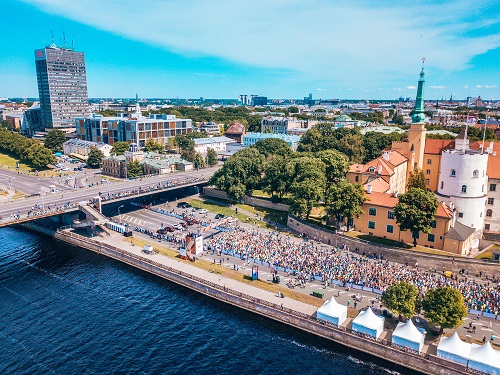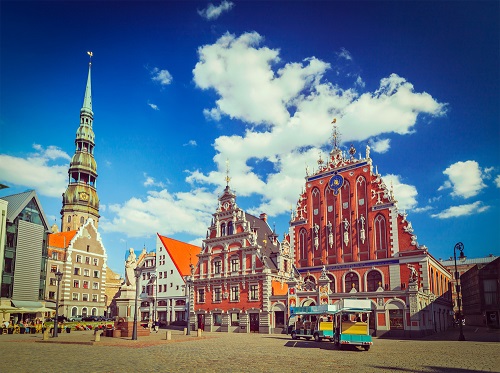The lovely country of Latvia offers many opportunities for sporting activities. For example, you can take part in water sports, such as surfing and parasailing, along the country’s beautiful coastline. Alternatively, you could visit the mountainous regions, which have some excellent ski resorts.
If you are living in Latvia, or simply visiting, there are many opportunities to take advantage of. However, you will also need to make sure that you are covered for sports-related injuries. We will look at some of your options below.
What cover is available for residents of Latvia?
Latvia has a national health service, which operates on a co-pay scheme. If you are a permanent resident in Latvia, you will be entitled to access state-funded healthcare under the same conditions as Latvian nationals. If you come from the UK, you may be entitled to state healthcare paid for by the UK government.
As an expat from the EU/EEA, you will be able to use your EHIC. However, you may also want to take out private insurance, as this will cover you more comprehensively for non-acute situations. You will need to make sure that your current insurance covers you for sports injuries.
What cover is available for visitors to Latvia?
If you are visiting Latvia, you need to make sure that you have comprehensive travel or health insurance that will cover you in the event of a sporting injury. You may need to tailor this to your particular requirements, depending on the nature of the sports that you are planning to do. You may also wish to consider a policy that has a medical evacuation clause.

If you do sustain an injury, you will need to contact your health insurance provider to check that treatment will be covered under the terms of your policy. If so, your provider may be able to pay for your healthcare treatment directly. However, you’ll need to discuss this with the hospital, as they may ask you to pay in cash and then claim the money back from your insurance company once you have returned to your home nation.
Note that most insurers set out time limits for compensation claims. You will not be able to retroactively claim compensation for an injury suffered many years ago, for example.
If you have booked your holiday through a registered travel agent, you should be covered by existing legislation. They will be able to advise you with regard to making a claim.
Check that your existing health insurance policy covers you for repatriation, as many policies do not. Also, check that your policy has a clause that is dedicated to covering sports injuries. This can be either as additional cover or as specialist cover, such as water sports insurance.
If you do opt for specialist cover, make sure that this includes the activities that you are actually planning to do. Most companies will cover sporting activities to some extent, but the levels of protection can vary. Travel insurance policies may cover snorkelling and diving, for example, but not sea kayaking. Most will cover:
- Swimming
- Surfing
- Stand-up paddle boarding
- Snorkelling
- Water skiing
- Rowing
Check, too, that your specialised policy does not have personal liability clauses that exclude vehicles such as jet skis. For example, most travel insurance policies either do not include the following, or they have exemption clauses:
- Jet skiing – you must follow local rules relating to water safety
- Scuba diving – many policies will only cover you if you have an open water licence, are diving under the supervision of a licensed instructor, and do not dive below a specific depth limit (usually 130 feet, but this is unlikely to apply to your diving experience in Latvia, which will be mainly in the Gulf of Rīga)
- Sailing – you must stay within 10 to 12 nautical miles of the shore
- Yachting – you must be within 60 miles of a safe haven
- White water rafting – some providers will only cover grade one to three rapids, while others may cover up to grade five
- Fishing – some insurance providers won’t cover deep sea fishing or spear fishing
- Paragliding – usually only tandem paragliding with a licensed instructor is covered
In addition to watersports, Latvia offers extensive skiing opportunities, with a number of resorts, such as Gaizinkalns and Siguldas Pilsētas. So, make sure that your medical insurance covers you for any injuries on the slopes. You should be looking at a minimum of £3m in medical cover. Ensure that your policy includes travel back to your home nation if required, plus mountainside rescue. You will also need details of a 24-hour emergency helpline.

Make sure that your policy contains a personal liability clause. This will cover you against legal action if you injure another person. We recommend that you get cover of at least €1m.
A loss of use clause will cover you for any period when you cannot use your ski pass due to bad weather, illness or injury. This generally takes the form of a monetary amount per day lost, so if you injure yourself, factor this into your insurance claim.
If you are planning on engaging in any ‘extreme’ winter sports, such as heli-skiing, check whether your policy will cover this.
Finally, make sure that your private insurance includes reference to any pre-existing conditions.
See below for some average costs for a week’s winter sports coverage:
- Individual in their mid 20s: £8 to £79
- Couple in their early 30s: £13 to £133
- Family of four (children aged eight and 12): £19 to £239
- Couple in their early 60s: £24 to £140
Specialist policies can allow you to ski off-piste. Ski Club, for example, offers a policy for £130 annually for a 35- to 69-year-old for up to 45 days’ skiing a year. Alternatively, they offer £210 annually for a couple and their children.
Where to seek treatment in Latvia
Where you seek treatment will depend on whether you wish to access the public or the private sector. Either way, you should experience no problems in finding a suitable clinic. The ORTO clinic in Rīga, for example, offers treatments in sports medicine. It is partnered with the Latvian Olympic Committee and most of Latvia’s leading sports clubs, and it treats many top Latvian athletes.

